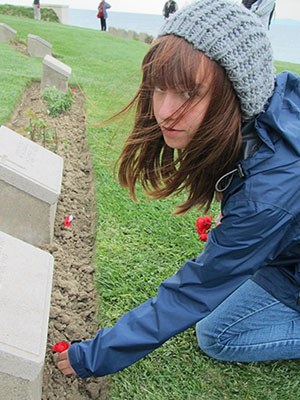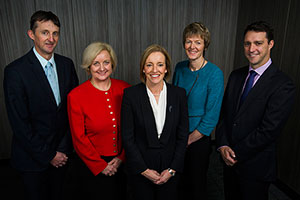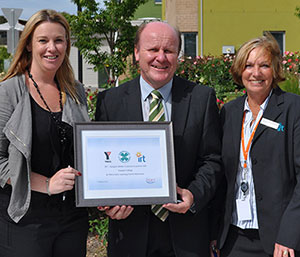A1 The organisation
Our vision and values
All children and young people in the ACT learn, thrive and are equipped to lead fulfilling, productive and responsible lives. We aim to position the ACT as the education capital of Australia, leading the nation in all areas of academic performance and student outcomes. Our vision relates to all phases of education and training, from early childhood education and care, through schooling and into training and education beyond school.
We are committed to improving individual achievement, increasing individual well-being and ensuring every young person progresses to meaningful and productive destinations whilst making a contribution to the economic and social wellbeing of the ACT. In achieving excellent outcomes for all children and young people in the ACT, it is our philosophy that Everyone Matters.
Fulfilment of our vision is supported by the Directorate's commitment to the shared ACT Public Service values of respect, integrity, collaboration and innovation. Our belief in these values is fundamental to our educational practice which ensures our children and young people aspire to, and achieve, their potential.
Box A1.1: ACT Chief Minister's ANZAC Spirit Prize 2013

On 17 April 2013, year 9 Campbell High School student, Beth Downing, travelled to Gallipoli on a 12 day study tour as one of two winners of the ACT Chief Minister's ANZAC Spirit Prize 2013. The Prize was inaugurated by the Chief Minister Katy Gallagher in recognition of Canberra's centenary in 2013 and the increasing interest in the approaching centenary in 2015 of the Gallipoli landing. Students were required to submit a creative response interpreting the ANZAC spirit. Beth attended the 2013 Dawn Service at ANZAC Cove followed by the Australian Service at Lone Pine. The two students and teachers who accompanied them also undertook educational activities at battlefield sites on the Gallipoli Peninsula and in Istanbul.
Our role
The role of the Education and Training Directorate is to ensure access to a high quality education for all and to position the ACT to lead the nation in educational outcomes for students.
The Directorate has responsibility for the provision of public schools and early intervention education programs, the regulation of early childhood education and care services, the registration of non-government schools and home education, and the planning and coordination of vocational education and training.
We are committed to ensuring that every child, young person and adult benefits from a high quality, accessible education, care and training system. We strive to ensure that all people in education, care and training will learn, thrive and be equipped with the skills and attitudes to lead fulfilling, productive and responsible lives.
By setting challenging goals, the Directorate will continue to lead the nation in education, care and training and ensure that our highly educated and skilled community will contribute to the economic and social prosperity of our city and the nation.
Our delivery of education, care and training outcomes is underpinned by our commitment to the ACT Government's values of respect, integrity, collaboration and innovation.
We will ensure student success through:
- quality teaching that engages students and supports the development of capabilities for life
- ensuring all ACT public schools provide positive and success-oriented learning environments
- providing learning pathways for students resulting in an educated and skilled workforce that meets the present and future needs of the ACT and region
- ensuring that the Directorate is recognised as a responsive, innovative and high achieving organisation that delivers on its commitments.
In 2013, consistent with recent years, there was growth in enrolments at ACT public schools. The February census in 2013 showed 40,879 students attending 86 public schools (Table A1.1), an increase of 805 students (2.0%) from 2012. This number included 2,035 students with special needs and 1,379 Aboriginal and Torres Strait Islander students.
The number of school leaders and teachers increased to 4,185 in 2013. The Teaching Staff Enterprise Agreement in operation from 2012 until expiry in 2014 introduced a number of incentives to attract, recruit and retain high performing teachers in ACT public schools.
Table A1.1: Enrolments in ACT public schools, 2009 to 2013
|
2009 |
2010 |
2011 |
2012 |
2013 |
|
|---|---|---|---|---|---|
|
Total students |
38,280 |
38,853 |
39,010 |
40,074 |
40,879 |
|
Students with special needs |
1,783 |
1,869 |
1,848 |
1,890 |
2,035 |
|
Aboriginal and Torres Strait Islander students |
1,082 |
1,208 |
1,283 |
1,337 |
1,379 |
With the opening in 2013 of Neville Bonner Primary School and Franklin Early Childhood School, the Directorate has responsibility for 86 public schools:
- 49 preschool to year 6 schools (including four Koori preschools)
- nine year 7 to 10 high schools
- eight year 11 and 12 secondary colleges
- six early childhood schools (preschool to year 2)
- four specialist schools
- seven preschool to year 10 schools (including one Koori preschool)
- one kindergarten to year 10 school
- one year 6 to 10 school
- one year 7 to 12 school.
In addition to these public schools, educational facilities providing specialist programs to students include Birrigai Outdoor School, the Murrumbidgee Education and Training Centre and the Instrumental Music Program.
The Instrumental Music Program, based at the University of Canberra High School Kaleen, enhances the education of children through the provision of quality music programs, including support of the Directorate's concert band and ensemble programs.
In November 2012 the Directorate assumed responsibility from the Community Services Directorate for the regulation of over 300 education and care services. This included centre-based services for children preschool age and under; out of school care services for school age children; government preschools; playschools for children preschool age and under and 8 family day care services.
In 2012-13 the Directorate was responsible for the regulation of 44 non-government schools with enrolments of 27,946 students. The number of students in non-government schools in 2013 increased from 27,462 in 2012, up 1.8 percent. The Directorate also registered more than 166 students for home education during the reporting period, and approved and supported more than 450 full-fee paying international students.
The Directorate develops strategic policy for vocational education and training in the ACT. In 2012 there were 30,068 students undertaking vocational education and training in the ACT. Of these, 851 were Aboriginal and Torres Strait Islander students (up from 729 in 2011) and 1,889 were students with a disability (up from 1,871 in 2011).
Following the ACT election in 2012, a Ministry for Higher Education was established, led by the ACT Chief Minister. The Directorate supports the Minister for Higher Education with advice on local higher education issues, including the development of a more integrated tertiary education sector and growth in the tertiary international student program.
Our structure
The Directorate is structured around four divisions, namely: Learning, Teaching and Student Engagement; Strategy and Coordination; Tertiary Education and Performance; and Corporate Services.
 The Director-General, Ms Diane Joseph (centre), the Deputy Director-General, Ms Leanne Cover (second from the right) and three Executive Directors Mr Stephen Gniel (far right), Ms Jayne Johnston (second from the left), and Mr Mark Whybrow (far left) form the Senior Executive Team.
The Director-General, Ms Diane Joseph (centre), the Deputy Director-General, Ms Leanne Cover (second from the right) and three Executive Directors Mr Stephen Gniel (far right), Ms Jayne Johnston (second from the left), and Mr Mark Whybrow (far left) form the Senior Executive Team.
The Learning, Teaching and Student Engagement Division comprises Aboriginal and Torres Strait Islander Education and Student Engagement and Learning and Teaching Branches. The major responsibilities of the Division are:
- development of policy, strategic planning and management of school support for Aboriginal and Torres Strait Islander students
- delivery and coordination of disability education, student wellbeing and behaviour support
- provision of early intervention programs, curriculum support and professional learning
- support for quality teaching and literacy and numeracy
- support for early childhood, early intervention and Koori preschool programs
- delivery and coordination of the Arts programs and performances through music.
The Strategy and Coordination Division includes the Information, Communications and Governance Branch and the Office for Schools. The major responsibilities of the Division are:
- provision of strategic advice to the Minister and the Directorate
- support effective communication and links with internal and external partners and the broader community
- deployment of information and communication technology (ICT) into learning environments
- administration of audit, risk and records management functions
- provision of legal advice to schools and other internal stakeholders, and,
through the Office for Schools:
- implementation of ACT Government policy on school education for all school age students
- leadership and management to drive continuous improvement in the delivery of early childhood, primary and secondary education in ACT public schools.
The Tertiary Education and Performance Division includes the branches of Planning and Performance and Training and Tertiary Education, as well as the Children's Policy and Regulation Unit and the International Education Section.
The primary responsibilities of the Division are:
- collection, management, reporting and dissemination of a large range of Directorate data, and data relating to education and training in the ACT
- development of corporate strategic plans and associated planning processes
- administration of local, national and international assessment programs
- provision of advice on school planning and development
- coordination and planning of vocational education and training services in the ACT
- implementation of local and national reforms in skills and workforce development
- support to, and liaison with, the tertiary education sector in the ACT
- promotion and management of international education students in public schools
- regulation of early childhood education and care services in the ACT to ensure that they meet the requirements of the National Quality Framework, including the Education and Care Services National Law, and the Education and Care Services National Regulations.
Finance and Corporate Support, Human Resources and Schools Capital Works are branches in the Corporate Services Division. The primary responsibilities of the Division are:
- the overall management of the Directorate's budget, including financial policy development, financial reporting and financial services
- to lead and build a sustainable and highly skilled workforce capability
- to ensure the safety of our workforce and proactively intervene for positive outcomes for individuals and workplaces
- the provision of innovative, inspiring and safe learning environments through the management of new capital works, capital upgrades, environmental sustainability and repairs and maintenance of schools.
Our clients and stakeholders
Our relationship with our clients and stakeholders is essential in shaping our future education system. We support the contribution of all stakeholders to create, enhance and regulate the ACT education and training system. By investing in an educational experience that is personal, valuable and meaningful, we create an environment in which learners can flourish and achieve their aspirations.
We work with and enable collaboration between students, parents and families, teachers, school leaders, non-government organisations, registered training organisations, education and care providers and tertiary education organisations to design and implement an integrated system for all learners. These partnerships are based on honesty and transparency, where voices are heard and opinions are valued.
By fostering genuine partnerships with families, our system is responsive to the needs of children, young people, families and the community. Families are given a voice in decision making and the skills and experience of parents is drawn upon. The system is inclusive of different family structures and recognises the value of strengthening families and community connectedness.
Our clients include over 68,000 school students and approximately 30,000 VET learners, along with their families; over 160 registered training organisations who are delivering vocational education and training in the ACT; and more than 300 centre-based education and care services. The views and involvement of our clients and stakeholders are vital to the achievement of our vision.
The building of connections and relationships with the ACT Aboriginal and Torres Strait Islander community, with the non-government education sector and with parents and students with a disability are critical components in the enhancement of positive outcomes for all students and young people in the ACT.
The Directorate engaged with clients and stakeholders through a number of regular meetings with groups such as: ACT Council of Parents and Citizens Associations, the Minister's Student Congress, the Australian Education Union, the ACT Principals' Association, the Aboriginal and Torres Strait Islander Education Consultative Group and the Disability Education Reference Group.
There was also a strong commitment to community engagement as reflected in consultation on the development and refurbishment of a number of new and existing schools. Within the early childhood education and care sector the Directorate engaged with key stakeholders to progress the regulation of services.
Box A1.2: Partnership between Hawker College, Kangara Waters and the YMCA Early Learning Centre

Under a new partnership arrangement between Hawker College, Kangara Waters and the YMCA Early Learning Centre Belconnen, the three organisations have agreed to collaborate and support each other to improve educational outcomes for students from Hawker College.
Key objectives of the partnership are to provide work experience and structured workplace learning placements for Hawker College students, promote aged care and child care as attractive working environments for students and to facilitate students' interests in working in these two sectors.
Pictured (left to right) Jodie Moore, Executive Manager of Children's Services at YMCA Canberra, Peter Sollis, Principal Hawker College and Christine Williams, General Manager South – IRT.
The Training and Tertiary Education Forums, the Government Schools Education Council and the Non-government Schools Education Council provide opportunities for stakeholders to participate in the formulation of education policy or provide input to specific initiatives.
A full report on consultation and engagement activities in 2012-13 is provided in Section B1.
